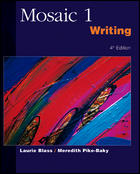|
 |  Mosaic 1 Writing, 4/e Laurie Blass
Meredith Pike-Baky
Bottled Water| Narrator: There is a reason why Melissa Shear buys her water. She doesn't trust tap water.Shear: Because it tastes gross. I use it for my dishes.Narrator: Customer after customer comes to the Water Lady Store each saying the bottle always beats the tap. But the NRDC says just because you pay, doesn't mean it pays off. The NRDC studied 103 bottled water companies. In one third of the bottled water, the NRDC found, instead of drinking water out of the bottle, you might as well drink it right out of the tap.NRDC Man: If people are going to spend hundreds or thousands of times more per gallon for bottled water than they do for tap water, ...Narrator: But most of us don't know. The NRDC study found 25% of bottled water came directly from tap water. Some contained arsenic, others high levels of bacteria. Sonia Scribner assures her customers her water goes through an intense filtration system. She says once you put filtered water into a bottle, that's when bacteria grows.Sonia: It's the time frame involved. The, I would also say, there's a lot of hands handling it. You want to go right to the source is my opinion.Narrator: According to the study, the best source may be the tap water in your house.Shear: Wow! Well then somebody is making a lot of money.Narrator: The bottled water industry made four billion dollars to be exact in 1997 alone, banking on public trust. The NRDC says it's time for the public to rethink what it's drinking. |
|
|



 2002 McGraw-Hill Higher Education
2002 McGraw-Hill Higher Education

 2002 McGraw-Hill Higher Education
2002 McGraw-Hill Higher Education